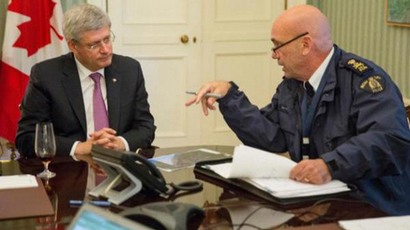‘Work for free!’ Bank of Canada chief derided over advice to unemployed youth

With unemployment among Canada’s youth stuck in the double-digits, Bank of Canada Governor Stephen Poloz has triggered a firestorm by suggesting that jobless teens work for free as a way to perk up their resumes.
According to Poloz, this is a good way to wait for the recovery
to take over.
“Look, having something unpaid on your CV is very worth it,
because that's the one thing you can do to counteract this
scarring effect. Get some real-life experience even though you're
discouraged, even if it's for free," Poloz told reporters.
#StephenPoloz so i should just work for free for a few months and like...starve to death? guess that clears up yr problems..
— Nicole Polish (@KneeKeyPea) November 5, 2014
Presently, Canada's youth unemployment rate is 13.5 percent, or
200,000 people, while the number of employed youth has witnessed
little change since the 2008 recession.
Canada's overall unemployment rate is 6.8 percent.
"I bet almost everyone in this room knows at least one family
with adult children living in the basement," Poloz said in a
speech Monday in the capital Ottawa. "I'm pretty sure these
kids have not taken early retirement."
It was Poloz’s recommendations given Monday on how to relieve
this trenchant problem dragging down Canada’s economic growth
that attracted the most attention.
One could argue that a young person working a min wage job is contributing more to Canada's economic recovery than you are, #StephenPoloz.
— c_kenn (@c_kenn) November 5, 2014
Poloz, who earns more than $435,000 annually, did not back down
from his position on Tuesday when he told the parliament’s
Standing Committee on Finance that it was important for
unemployed youth to "volunteer to do something that is at
least somewhat related to your expertise set, so it's clear that
you are gaining some learning experience during that
period."
“Are you aware that unpaid jobs increase income
inequality?” asked Liberal MP Scott Brison, who argued that
the children of wealthier families could afford to work for free,
whereas many others could not.
Poloz responded by saying: “I would say that there’s some
truth to what you’re saying, but when there are those
opportunities, people should grab them," Business in Canada
quoted him as saying.
I think #stephenpoloz should work for free and divide his salary amongst unemployed youth. If we don't need to eat, you don't either.
— Jazmin Lihou (@lihoujazmin) November 5, 2014
The suggestion that young people should accept unpaid employment
at a time when the economy was in the doldrums was greeted with
hostility from many.
"It's extremely frustrating," Claire Seaborn, founder
and president of the Canadian Intern Association, told The Globe
and Mail. "It's a complete misunderstanding of our employment
and workplace laws in Canada ... and it shows a huge devaluing of
young people and recent graduates' abilities in the
workplace."
The Canadian daily went on to quote labor lawyer Andrew Langille,
who estimated the number of unpaid interns “at around 100,000
a year,” a level that he says has increased since the start
of the economic downturn.
Several Canadian publishing houses, including Toronto Life, were
scrutinized last year when it was revealed they were offering
unpaid employment, prompting an investigation by Ontario's
Minister of Labour.
These controversial types of internships have become more common
across the board, from telecom companies to retail and even
engineering, said Seaborn, of the intern association.
"Interns have to be paid, unless they're getting school
credit,” she said.














